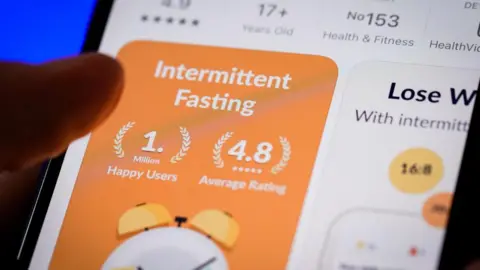Intermittent fasting has become the diet trend of the decade. It promises to hack biology without the drudgery of counting calories or cutting carbs: simply change when you eat, not necessarily what you eat. Tech moguls swear by it, Hollywood stars insist it keeps them trim. Britain's former prime minister Rishi Sunak once spoke of starting his week with a 36-hour fast.
So far the science has seemed supportive. Research suggests that extending the overnight fast may improve metabolism, aid cellular repair and perhaps even prolong life. Nutritionists, however, have long warned that skipping meals is no magic bullet - and may be risky for those with underlying conditions.
Intermittent fasting compresses eating into a short daily window, often eight hours, leaving a 16-hour gap without food. Other time-restricted diets, like the 5:2 plan, limit calories on certain days rather than hours.
Now, the first large-scale study of its kind raises a more serious red flag. Researchers, analysing data from more than 19,000 adults, found that those who confined their eating to less than eight hours a day faced a 135% higher risk of dying from cardiovascular disease than people who ate over 12-14 hours.
An elevated cardiovascular risk means that, based on a person's health, lifestyle and medical history, they are more likely than others to develop heart-related problems such as heart attack or stroke. The link to overall mortality - deaths from any cause - was weaker and inconsistent, but the cardiovascular risk persisted across age, sex and lifestyle groups even after rigorous testing.
The authors stress that the study doesn't prove cause and effect. But the signal is striking enough to challenge the narrative of fasting as a risk-free path to better health.
Researchers tracked American adults over eight years. Participants were asked on two different days to recall everything they ate and drank, and from these dietary recalls, scientists estimated each person's average eating window.
Those who ate within an eight-hour window faced a higher risk of dying from cardiovascular disease than those who spread meals over 12-14 hours. The elevated cardiovascular risk was consistent across socioeconomic groups and strongest among smokers and people with diabetes or existing heart disease.
This runs counter to the popular belief that time-restricted eating improves heart and metabolic health. Numerous trials suggest it can promote weight loss and improve blood pressure, but there are potential downsides, including nutrient deficiencies and increased cholesterol.
The new findings warn that those with heart disease or diabetes should be cautious about adopting an eight-hour eating window. The safest bet may be to focus less on the clock and more on what is actually on the plate.
So far the science has seemed supportive. Research suggests that extending the overnight fast may improve metabolism, aid cellular repair and perhaps even prolong life. Nutritionists, however, have long warned that skipping meals is no magic bullet - and may be risky for those with underlying conditions.
Intermittent fasting compresses eating into a short daily window, often eight hours, leaving a 16-hour gap without food. Other time-restricted diets, like the 5:2 plan, limit calories on certain days rather than hours.
Now, the first large-scale study of its kind raises a more serious red flag. Researchers, analysing data from more than 19,000 adults, found that those who confined their eating to less than eight hours a day faced a 135% higher risk of dying from cardiovascular disease than people who ate over 12-14 hours.
An elevated cardiovascular risk means that, based on a person's health, lifestyle and medical history, they are more likely than others to develop heart-related problems such as heart attack or stroke. The link to overall mortality - deaths from any cause - was weaker and inconsistent, but the cardiovascular risk persisted across age, sex and lifestyle groups even after rigorous testing.
The authors stress that the study doesn't prove cause and effect. But the signal is striking enough to challenge the narrative of fasting as a risk-free path to better health.
Researchers tracked American adults over eight years. Participants were asked on two different days to recall everything they ate and drank, and from these dietary recalls, scientists estimated each person's average eating window.
Those who ate within an eight-hour window faced a higher risk of dying from cardiovascular disease than those who spread meals over 12-14 hours. The elevated cardiovascular risk was consistent across socioeconomic groups and strongest among smokers and people with diabetes or existing heart disease.
This runs counter to the popular belief that time-restricted eating improves heart and metabolic health. Numerous trials suggest it can promote weight loss and improve blood pressure, but there are potential downsides, including nutrient deficiencies and increased cholesterol.
The new findings warn that those with heart disease or diabetes should be cautious about adopting an eight-hour eating window. The safest bet may be to focus less on the clock and more on what is actually on the plate.





















